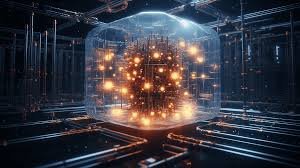Introduction
Quantum computing, a revolutionary paradigm in computing technology, holds the promise of solving complex problems beyond the capabilities of classical computers. As we delve into the realms of quantum mechanics and information theory, the potential applications of quantum computing are boundless. In this article, we embark on a journey into the world of quantum computing, exploring its principles, challenges, and transformative potential for the future of technology and beyond.
Tech Trends 2023: Exploring the Future of Technology
Quantum Mechanics: The Foundation of Quantum Computing
At the heart of quantum computing lies the principles of quantum mechanics, a branch of physics that describes the behavior of particles at the smallest scales. Unlike classical computers, which use bits to represent information as either 0 or 1, quantum computers leverage quantum bits, or qubits, which can exist in multiple states simultaneously due to the phenomenon of superposition. In 2023, researchers harness the power of qubits to perform parallel computations, enabling quantum computers to tackle complex problems exponentially faster than classical computers.
Superposition and Entanglement: Quantum Phenomena Driving Computation
Superposition and entanglement are two fundamental quantum phenomena that underpin the power of quantum computing. In superposition, qubits can exist in a state of 0, 1, or both simultaneously, exponentially increasing the computational power of quantum systems. In entanglement, qubits become correlated in such a way that the state of one qubit instantaneously affects the state of another, enabling the creation of highly interconnected and powerful quantum networks. In 2023, researchers continue to explore the applications of superposition and entanglement in quantum algorithms and protocols, paving the way for breakthroughs in computation and cryptography.
Applications of Quantum Computing: From Optimization to Simulation
The potential applications of quantum computing are vast and diverse, spanning fields such as optimization, cryptography, drug discovery, and materials science. In 2023, researchers and industry leaders explore the use of quantum algorithms to solve optimization problems, such as route planning, supply chain management, and portfolio optimization, with unprecedented speed and accuracy. In cryptography, quantum computers threaten to disrupt existing encryption schemes, prompting the development of quantum-resistant cryptographic protocols to secure communication and data transmission in the quantum era.
Quantum Simulation: Unlocking Insights into Complex Systems
Quantum computers also hold the potential to revolutionize scientific research through quantum simulation, the process of simulating complex quantum systems that are prohibitively difficult to study with classical computers. In 2023, researchers use quantum simulators to model the behavior of molecules, materials, and biological systems with unprecedented precision, offering insights into fundamental physical phenomena and accelerating the pace of scientific discovery.
Challenges and Opportunities: Navigating the Quantum Landscape
Despite its promise, quantum computing faces significant challenges, from the fragile nature of qubits to the need for error correction and fault tolerance. In 2023, researchers and engineers work tirelessly to overcome these challenges, developing novel approaches to qubit fabrication, error correction codes, and quantum hardware design. As the field of quantum computing continues to evolve, so too do the opportunities for innovation and discovery, paving the way for a quantum revolution in computation and beyond.
FAQs (Frequently Asked Questions)
- What is quantum computing, and how does it differ from classical computing?
- What are qubits, and how do they enable quantum computation?
- What are some potential applications of quantum computing in various fields?
- How does quantum cryptography differ from classical cryptography?
- What are the challenges facing the development of practical quantum computers?
- How does quantum simulation enable scientists to study complex systems?
Conclusion
As we conclude our journey into the world of quantum computing, one thing becomes clear: we stand on the brink of a quantum leap in computation and scientific discovery. From the principles of quantum mechanics to the applications of quantum algorithms, the potential of quantum computing to revolutionize technology and society is immense. As researchers and engineers continue to push the boundaries of what is possible with quantum systems, we can only imagine the transformative impact that quantum computing will have on the future of technology, unlocking new frontiers of knowledge, innovation, and human progress.
